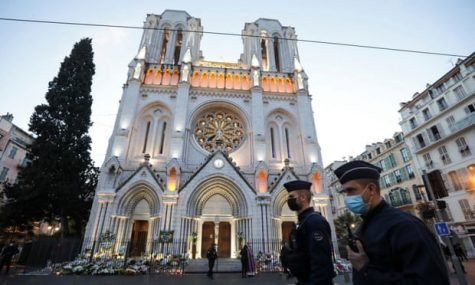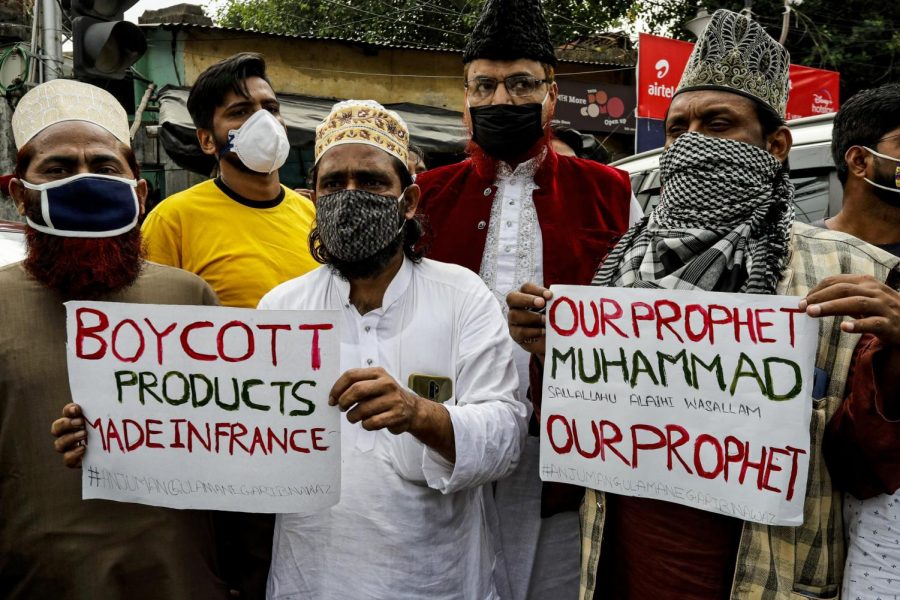What’s Happening in France?
France is currently fighting a battle between the difference of freedom of expression and freedom of religion.

The beautiful country of France is known for its astonishing scenery and its world-famous Eiffel Tower in Paris, but recently, riots, boycotts, and violent attacks have made the country seem a little less beautiful. At stake is religious freedom, as thousands of Muslims have decided to take a stand and protect their right to practice their faith.
The Constitution of France states, “France is an indivisible, secular, democratic and social Republic, guaranteeing that all citizens regardless of their origin, race or religion are treated as equals before the law and respecting all religious beliefs.” When the Law on the Separation of the Church and State was recognized in 1905, this gave people the power to practice freedom of religion.
In October of 2020, teacher Samuel Paty displayed two caricatures of Muhammad, the founder and prophet of Islam, to correlate with his lesson on freedom of expression. According to Vox, the two images that were displayed were “published by the satirical magazine Charlie Hebdo – the same images that in 2015 inspired jihadists to kill 11 staff members at the magazine and six others in Paris” (vox.com). Teachers and parents expressed that Paty allowed his Muslim students to look away or leave the classroom, but this did not avoid the fact that visual displays of Muhammad are considered disrespectful in the Muslim faith.
The holy book within the Muslim religion, the Quran, highly discourages any images of their prophet to be shown in order to avoid the temptation of idol worship.
CNN stated, “While the Quran does not explicitly prohibit depictions of Muhammad, most contemporary Muslims worldwide abide by the ban, based largely on religious rulings by Islamic scholars” (cnn.com).
On October 16, Paty was attacked and violently killed. His attacker tweeted claims as if he had done a service to the world by killing the man who displayed Muhammad visually. In response to this, the President of the French Republic, Emmanuel Macron, turned the teacher into a freedom-of-expression hero.
During Samuel Paty’s memorial, Macron stated the country will “intensify” efforts to end all forms of Islamic extremism in France. He also hopes to seamlessly integrate Muslims into French society. However, Macron says extremists are impeding that integration due to the recent boycotts. As a result, he has begun to carry out deportations, raids, and ordering the dissolution of some Islamic groups. Government buildings displayed images of the cartoons on French during Paty’s memorial.
In an interview with the newspaper, The Libération, the Interior Minister of France, Gérard Darmanin, said we are “sending a message [to] fight an ideology, not a religion.” Although to the thousands of Muslims all over the world, it seems as if suppression of their religion is exactly what is happening.
Muslims from different countries including Morocco, Saudi Arabia, and Turkey responded by boycotting French products and grocery stores. In Kuwait, Qatar University canceled its “French Week” as a way of taking part in the anti-Macron movement.
On October 29, an attack at the Notre-Dame basilica in the city of Nice bore similarities to the attack of the schoolteacher Paty. France’s chief anti-terrorism prosecutor, Jean-François Ricard stated. “the victims were ‘targeted for the sole reason that they were present in the church at the time’” (bbc.com) Amidst the tensions rising within the Muslim community, the Islamic extremist killed a total of three people that night.
The New York Times stated, “While it is not clear whether the attack on Thursday was carried out in response to the government’s measures, it immediately fortified calls among the French authorities for even tougher efforts to combat Islamic extremism in ways that are almost certain to deepen the polarization of the country” (nytimes.com).
The senior World Religions class has had the opportunity to educate themselves about the Islamic religion and the events in France. Delanee Saguros ‘21 said, “I feel like it’s a really eye-opening experience to learn about the Islamic religion because we’re not really properly educated in the beauty and passion of the religion. As for the events happening in France, it is really heartbreaking to see so much terror from a religion that exemplifies so much beauty.”
The events that are taking place in France may lead to an overwhelming amount of fear and confusion far beyond its borders. It is difficult to hear about violent attacks and boycotts no matter where they occur. It is a little too easy to say that love will conquer these issues in the end. So perhaps simple acceptance of other views, philosophies, and religions is a better goal.

